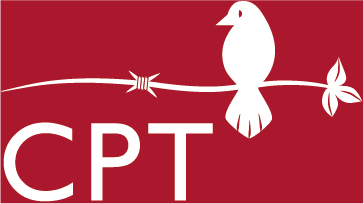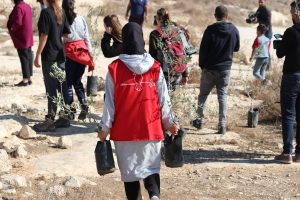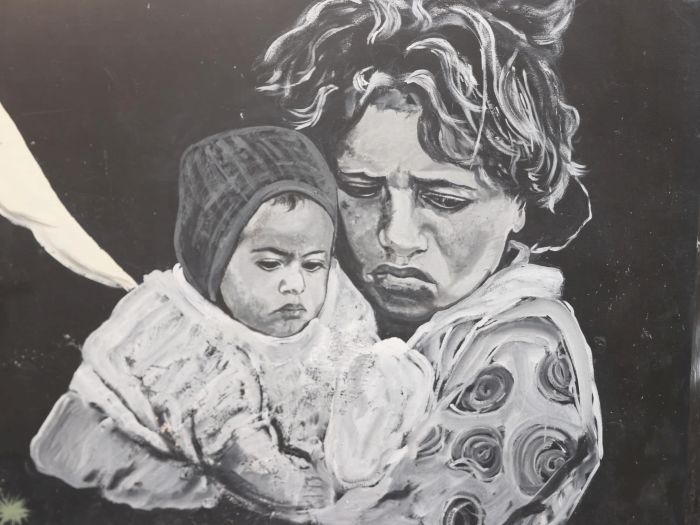 [Editor’s Note: The following article was first published by Community Peacemaker Teams on 29 August 2025, as one of their Friday Bulletin emails.]
[Editor’s Note: The following article was first published by Community Peacemaker Teams on 29 August 2025, as one of their Friday Bulletin emails.]
Every budget is a moral document. Whether drafted by a government or an individual, it reflects what – and who – we value. As global military spending surges past two trillion dollars annually, many are asking urgent questions about where our money goes, and what violence it might be underwriting. At this moment – when we are witnessing the devastation of Gaza, the forced displacement of Palestinian communities in the West Bank, and the expansion of militarized policing and surveillance worldwide – those questions feel especially urgent.
What if we simply refused to fund war?
War tax resistance is not a new idea. It is as old as militarism itself. From the early Quakers who refused to finance Britain’s imperial campaigns, to the U.S. American abolitionists who withheld taxes to protest slavery, to Mohandas Gandhi’s salt tax resistance under British colonial rule, history is full of people who challenged injustice by refusing to pay for it.
One powerful example is the Beit Sahour tax strike during the First Intifada. In 1989, residents of this small Palestinian town in the West Bank collectively refused to pay taxes to the Israeli occupying authorities. Their slogan was simple but radical: No taxation under occupation. It was a nonviolent uprising of civil society – shopkeepers, teachers, families – who believed that their resources should not finance the machinery of their own repression. The response from Israeli forces was swift and harsh: military raids, curfews, and mass arrests. But the spirit of resistance endured, and the story of Beit Sahour became a symbol of dignity and nonviolent defiance across the world.
That same spirit lives on in our supporters who choose to redirect their taxes to support the work of CPT.
“I have been deeply troubled for years that a portion of the taxes I pay support war and destruction,” wrote longtime CPT supporter Nancy Davis. “With the genocide taking place in Gaza… I donated the amount of my taxes that went to the present military. I consider it a privilege to support the work of peacebuilding because it is needed to help make the world a place where all people can thrive.”

CPT member in Palestine. Photo from CPT website.
For Christian pastor and CPT supporter Sarah Klaassen, the act of redirection was rooted in lived experience. After spending time with CPT’s team in Al-Khalil/Hebron, she shared: “When it came time to pay my taxes, Palestine was on my mind. This year, I joined the war tax resistance community, redirecting a symbolic amount to CPT. It’s one more way to live the Gospel of peace.”
Others, like supporter Hannah Klaassen, describe redirection as a form of moral alignment: “I’ve moved through many stages – admiration, apprehension, curiosity, and finally commitment. When I struggle to know how best to respond to injustice, I find clarity and power in this form of resistance.”
And for longtime resisters like Stan Becker, it’s a lifelong journey. “If it is wrong to kill,” he reflects, “it must be as bad or worse to pay someone else to kill in your place.” As a young Quaker, Stan began exploring war tax resistance in the 1960s, refusing to fund U.S. wars in Vietnam and Central America. He has since redirected significant portions of his income toward peace work. “Even when financial pressures made it difficult,” he shares, “our family found ways to prioritize peace in how we gave.”

Mural from Aida Refugee Camp in Bethlehem. Photo from CPT website.
War tax resistance is not always easy. It can involve legal risk, social pressure, or financial sacrifice. But it is also an act of hope. Of imagination. Of integrity. At its core is a simple, profound conviction: that we must not fund violence with our silence or our resources.
At CPT, we are deeply moved by this witness. Your acts of resistance make our work possible. In the face of occupation and militarism, our teams in Palestine and elsewhere stand in partnership with communities resisting violence with courage and dignity. Your redirection of war taxes sustains that work – from protective presence and accompaniment to advocacy and storytelling.
To those who have redirected their taxes to CPT – your choice is more than symbolic. It reflects a deep reckoning with conscience and complicity, a refusal to allow your resources to be used in the service of violence. In doing so, you make room for something more just, more humane, more possible. It’s an affirmation of the kind of world you want to build. Thank you for trusting us to carry that vision forward. You remind us that peace is built step by step, act by act.
Alicia Rynkowska
Development Coordinator
Community Peacemaker Teams
